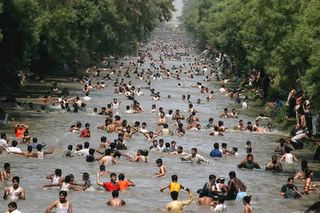privatisation of PTCL part deux
moizza said...
I’ll pitch in for privatization if you can convince me the following issues will somehow be countered:1. Telecommunication, gas, electricity etc. are public goods that have become significant enough to count as indicators of a high standard of living in any area of the country. A private company that operates on the principle of profit (and efficiency is defined in terms of the cost effective ways to achieve profit) is hardly likely to have the incentive to invest in infrastructure in far flung, poverty stricken and terrain-wise inhospitable areas such as Balochistan. Under state control or in the garb of an even public-private enterprise, profit concerns are traded off with concerns of good governance. Admittedly, Pakistan is missing covering barely half of the are with a telephone network but that just makes a case for a further decline in the scope of service in private hands.2. Siphoning money abroad is actually a minor issue compared to the larger implications of the PTCL Act Of 1996; specifically with regards to Jarrar’s statement “in this case theres not much to worry about cos the company that had the highest bid only controls 26% of PTCL.10% is on the stock market while the other 64% belongs to the government.hence they cant take the profits and run.”“Section 90 of the Companies Ordinance, 1984 requires that the rights as to profits, votes and other benefits between various classes of ordinary shares are to be proportionate to the paid up value of such shares. Through the Pakistan Telecommunication (Reorganization) Act, 1996 the company has been exempted from the provisions of Section 90. Except for voting rights the "A" and "B" class ordinary shares rank pari passu in all respects. "A"[insert: 74%] ordinary shares carry one vote and "B"[insert: 26%] ordinary shares carry four votes.”Implication? The 26% shares sold are all B class shares i.e. will give the holder 26*4 = 104 votes while the government will have 62 only. As a minority shareholder it is unlikely to be able to swing any sort of clout which goes back to issues of money draining out; security control; and subsidized provision to poor villages in remote areas etc. You’d think there would be a way out of it? The above quoted article continues“The "B" ordinary shares are intended for sale to the strategic investor on the privatization of the company. "A" ordinary shares cannot be converted into "B" ordinary shares. However, "B" ordinary shares may be converted into "A" ordinary shares at the option exercisable in writing submitted to the company by the holders of three fourths of the "B" ordinary shares. In the event of termination of the license issued to the company under the provisions of Pakistan Telecommunication (Reorganization) Act, 1996 or any change of control of the strategic investor within seven years of transfer of "B" ordinary shares, the "B" ordinary shares shall be automatically converted into "A" ordinary shares.”What is the likelihood of conversion? It’s a private company not the Pope.3. Protests against privatization have been registered at the party level, the military (who call it a strategic asset and hence see privatization as exposing sensitive state communication to external control), trade union level (and to that end “yes people lose their jobs.but overall consumers benefit from better service” is harsh. I really don’t want a better service than the one I have, ESPECIALLY at the cost of a high unemployment level. Its Mobilink I have a problem with, not PTCL/Ufone.) and various civil associations. The government in its characteristic ways has responded through diplomatic press releases, buying off workers, and crackdowns on union leaders. If the state role in the economy has to be limited, coercive interference is not way to do it.4. Yes WAPDA should be privatized. It’s a blood sucking leech. But not PTCL. We have got to be the first country that privatizes a profit making company. Service providers at the national level always tend to be monopolies (the bar is too high for an average investor). To that end at a personal level, I have my doubts about the notion of improved customer service etc. There is no other company rivaling PTCL in the range of provision because of the prohibitive costs to, so there will be no competition so to speak.
9:22 AM
Jarrar Shah said...
excellent points.firstly i think ure right about the minority/majority share holder thingy.on a personel level i dont have a problem with foreign entities taking out profits as long they are paying taxes to the GOP,expanding businessess and jobs in Pskistan.like you said theyre not the pope but at the same time they are a profit seeking enterprise.and Pakistan with a teledensity level of 3% is a huge potential market.as for not wanting better consumer service at the expense of jobs.well i dont agree with the fact that PTCL is giving good services.one of the hardest things to do is to get a phone connection.if u develop a fault or wind knocks down ure wires, it takes them a good five-six days if youre lucky to fix the proble.it takes a good month or two again if youre lucky and well connected to get a land line connection.so frankly PTCL service wasnt really that good.jobs is a harsh thing and i know.but why should any organisation be overstaffed.the point of a telecom company is to provide services and employment but not over employment.ure right in saying that PTCL was profitable so why the need for privatisation.the point was that PTCL's profitability wouldve lasted two years at the max.reason being that the govt. deregulated the telecom industry 2-3 yrs ago.hence the arrival of worldcall,GO CDMA,teletips etc.because of that deregulation,150,000(should be more) poor people became entrepreneurs.their business being PCO's all over Pakistan.i have a huge problem with mobilink believe me.they should be fined.im just too lazy too change my provider.but these providers are a huge competitor to PTCL as well.for the first time in history the number of mobile users surpassed PTCL consumers.people like us who have access to both are using mobiles more and more.all this means and meant lower revenues and consequently lower profits for PTCL.once the profits died up PTCL like before and like WAPDA right now would have become a subsidised govt. utility provider.PTCL is no longer a monopoly in the telecom sector.hence to expect them to be profitable for long is hard to imagine.now PTCL being in private hands does a few things.firstly it stops being the govt. headache and us tax payers headache in the future.secondly the govt. gets a record amount of money that will be used to lower our debt and 10% of the money will go to poverty alleviation.thirdly being in private hands, PTCL will become efficient. i dont know of many foreign firms that are not more efficient than govt. entities, hence it gives PTCL a better chance to survive in a competitive telecom market.finally and most importantly it sends a signal to the rest of the world in general and flushed with oil wealth gulf investors in particualr that Pakistan is an exciting and growing economy where money can be poured in and opportunities availed.this is how Maoist China lifted 300 million and counting poeple out of poverty.will jobs be lost.perhaps.but according to my understanding not for the next two years.after that meritocracy will take place in PTCL.there are two sides to the job issue.if someone who was placed in PTCL by a political bigwig to establish patronage does not deserve to be in PTCL and is fired after a two year period so be it. what we have to understand is that govt. employees are usually political appointees.merit needs to be introduced in our society.govt. cant do that.private sector can.as for services going to far flung areas.thats a concern.but with the introduction of wireless loop by PTCL and others i think it wont be very expensive to provide coverage to far flung areas.i hope i dont sound like a blood thirsty capitalist know it all.its just that we need to move fast.the people of this country have suffered more than enough.its time prosperity started reaching our society cos the world will leave us far behind.the govt. if it was capable would have done what needed to be done.unfortunatly govt,bureacracies cant run enterprises.its not in their make up.its not in their training.its not in their culture.plus history's not on their side.there can and will be exceptions but they'll be exceptions to the rule.
as someone aptly described democracy;democracy is simply the least worst of bad political systems.one could say the same about privatisation and market economy.



